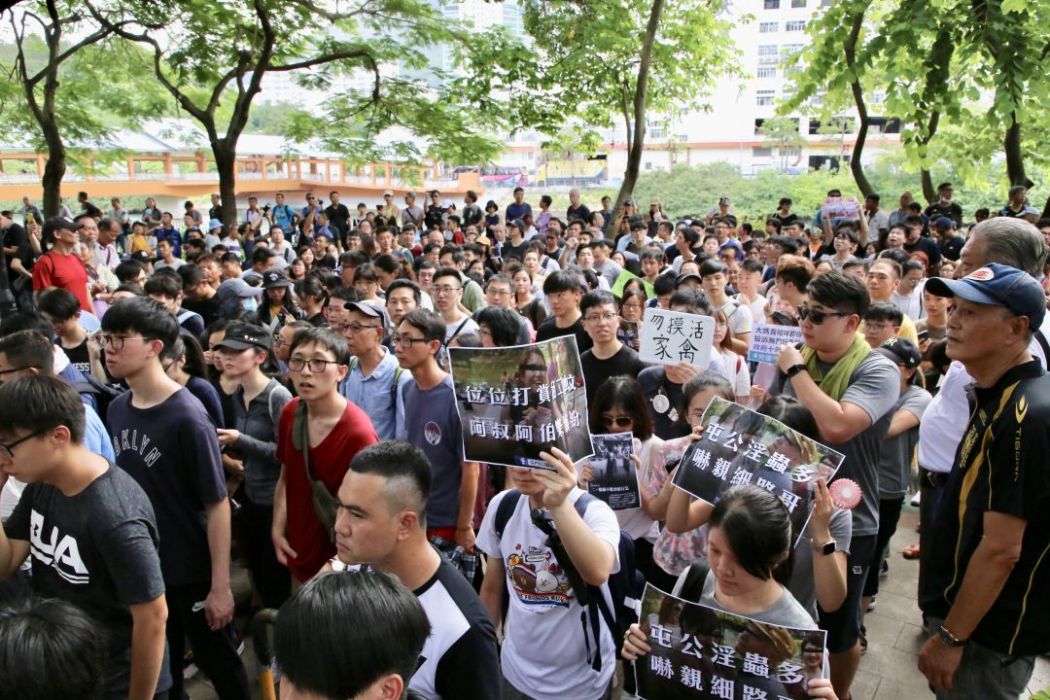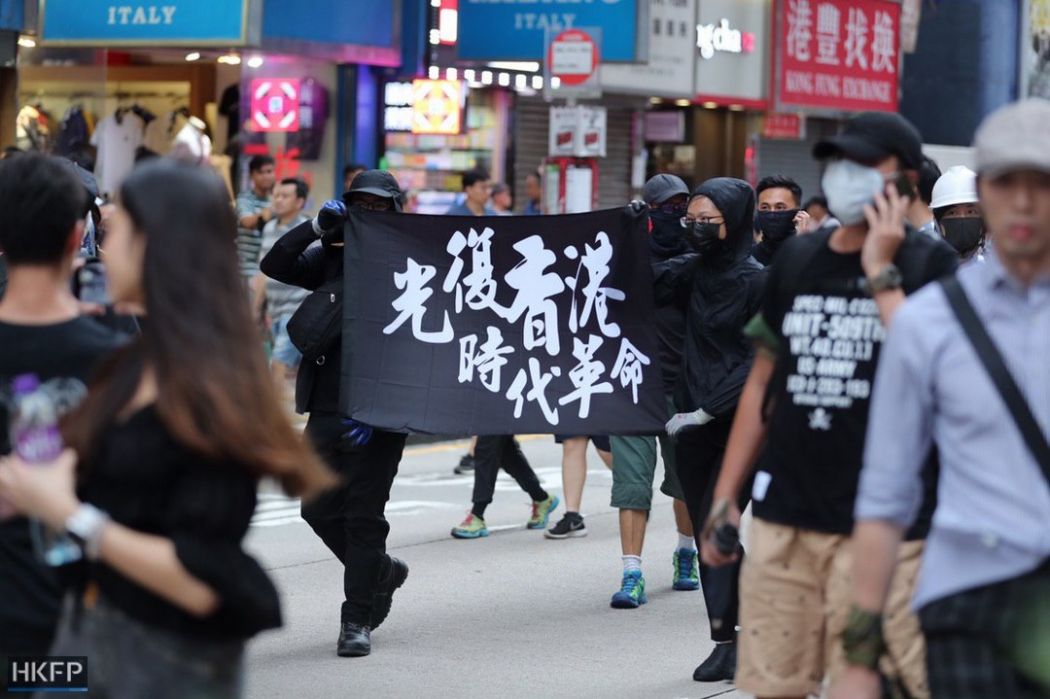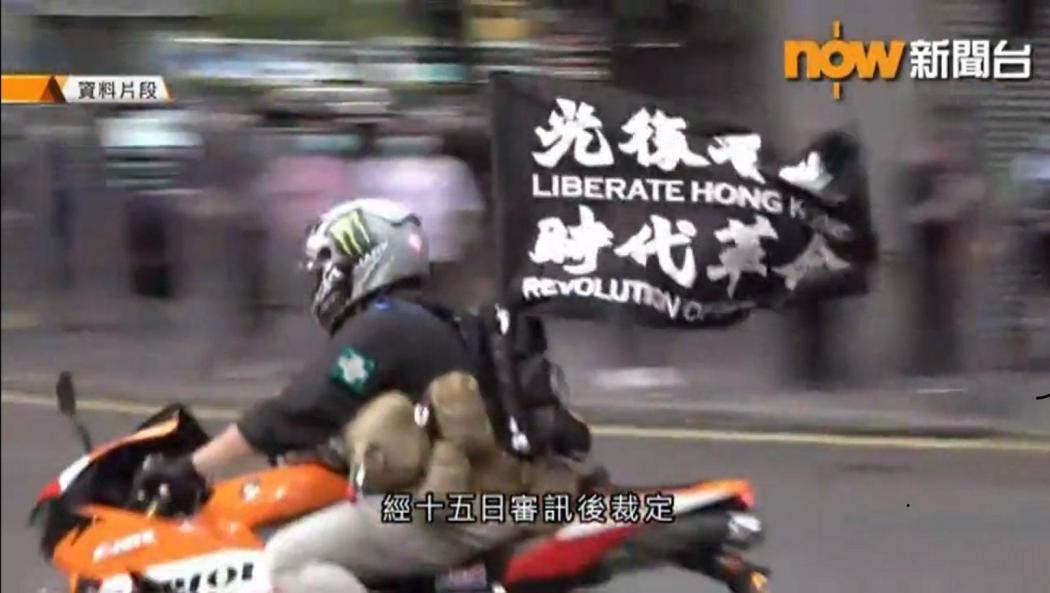Hong Kong independence activist Edward Leung has been released from prison on Lantau Island, after spending four years at a top security facility for taking part in a riot in 2016.
The 30-year-old activist’s release comes as over 150 have been arrested under the Beijing-imposed national security law, enacted in 2020, which criminalises acts and calls for secession, subversion, terrorism and collusion with foreign powers.

Leung walked out of Shek Pik prison before 3 a.m. on Wednesday after officials said his release would happen overnight for his own safety. Metal barriers prevented reporters from approaching the prison gates. Leung boarded a police-owned van and was escorted by four police vehicles.
At around 5:45 a.m., he said on Facebook that he had been reunited with his family, but will keep away from the public spotlight and not use social media: “After four years, I want to cherish the precious time I have with my family and restore a normal life. I would like to express my genuine gratitude for all your care,” he wrote, according to AFP.
On Tuesday, Leung’s family members had urged supporters to refrain from showing up at the far-flung facility: “Time passed by like flowing water. Edward spent four summers and winters in jail. He was blessed to be so deeply loved by everyone, who never left his side as he trudged through these four years,” the message read. “The days were harsh, but they were not spent in vain.”

The page was later deleted in accordance with legal advice.
After failing in his appeals, Leung was moved to a maximum security cell in 2020. He typically worked on book binding during his time in prison, local media reported. He is likely to remain under surveillance by law enforcement even after release, including by the national security authorities, the SCMP reported.
The driving road outside Shek Pik Prison where Edward Leung was released from remains loosely blocked. All is quiet and two buffalos came closer but they didn’t say anything. pic.twitter.com/nqMqoD9asL
— Xinqi Su 蘇昕琪 (@XinqiSu) January 18, 2022
Leung was sentenced to six years behind bars in 2018 after being convicted of participating in a riot and and assaulting a police officer in Mong Kok during protests in February 2016. He was found guilty of hitting the officer with a plastic cylinder and a wooden board from behind, and kicking him.
Hawkers & parallel traders
During Lunar New Year in 2016, activists – including members of the political group Hong Kong Indigenous, for which Leung was a spokesperson – had called on the public to attend festive night markets. Protesters had come out in support of local street food hawkers, who the authorities had attempted to clear from the streets.

But violence erupted between police and protesters as people swarmed into Mong Kok in support of the campaign. Dozens of protesters were jailed for their involvement in the clashes, including Leung.
Although he remained largely out of the public eye since he was put behind bars, Leung was one of the city’s most prominent activists who advocated for independence and “localist” beliefs along with Hong Kong Indigenous. The authorities have since made calls for independence illegal.
Formed in January 2015, the group emerged as a radical voice on the fringes of the city’s political spectrum in the immediate aftermath of the 2014 pro-democracy Umbrella Movement.
The group saw itself as an alternative to the dominant voices of the time, including the traditional pan-democrats and well-known student leaders such as Joshua Wong, Alex Chow and Lester Shum, who championed peaceful demonstrations and civil disobedience.
Instead, Leung and his colleagues advocated for “using force against tyranny” and believed Hongkongers should have an identity and state separate from that of China, with a right to determine its own political future. Chinese authorities dubbed the 2016 protests “separatist” as a result.

In 2015 and 2016, the number of parallel traders from mainland China shopping for tariff-free milk powder or cosmetics in the city’s northern districts surged. The pharmacies, cosmetics shops and jewellery stores catering to the explosion in demand drove out many small local businesses.
Sensing increasing frustration among residents who found their daily lives disrupted, Hong Kong Indigenous held protests with other localist activists at parallel trading hotspots, such as in Sheung Shui, Tuen Mun and Sha Tin. Their campaign to drive away visitors from mainland China under the banner “Reclaim Tuen Mun” or “Reclaim Sheung Shui” ended with dozens arrested.

But Leung’s most prominent – or perhaps only – legacy is a now-criminalised eight-word slogan he came up with when running for a Legislative Council by-election in 2016.
Eight-word slogan
During the anti-extradition bill protests that rocked the city in 2019, the slogan “Liberate Hong Kong, revolution of our times” came to overshadow the man who popularised it years earlier.
Asked by reporters what “revolution of our times” in his campaign slogan meant, Leung said: “You will know when the time comes.”
He ultimately lost the election, receiving 66,500 – or about 15 per cent – of the ballots. The group and its supporters nevertheless considered it a victory for their new political party.

Leung ran for office again in the 2016 legislative elections several months later. Election authorities asked all hopefuls to sign a letter declaring that Hong Kong was an inalienable part of China as a prerequisite for entering the race. After failing to challenge the requirement in the city’s courts, Leung relented, and signed.
But a top election official said Leung did not “genuinely” switch from his pro-independence stance, and ultimately barred him from running.
By the time Leung’s slogan re-emerged in 2019 as a clarion call chanted by hundreds of thousands of protesters, Leung had been in jail for over a year. Meanwhile, Hong Kong Indigenous co-founder Ray Wong had left Hong Kong for Germany, where he was granted asylum a year earlier. The group was all but dormant.

In a rare message to the public in late July 2019 at the height of the anti-extradition bill protests, Leung penned an open letter from prison, urging protesters not to be consumed with hatred, while praising them for “rewriting history.”
“When true justice has not prevailed, you may be filled with rage. This is only normal. But I beg that you must not allow hatred take over you,” he wrote.
Then, in June last year, prosecutors in the city’s first national security case unfurled a black flag inscribed with the slogan before three national security judges.

Although Leung himself was never summoned as a witness, after days of deliberation by a historian and sociologists, the judges ruled that the slogan incited secession, and sentenced a motorcyclist who drove into police officers while flying the flag to nine years in prison.
Support HKFP | Policies & Ethics | Error/typo? | Contact Us | Newsletter | Transparency & Annual Report | Apps
Help safeguard press freedom & keep HKFP free for all readers by supporting our team

LATEST FROM HKFP
HKFP has an impartial stance, transparent funding, and balanced coverage guided by an Ethics Code and Corrections Policy.
Support press freedom & help us surpass 1,000 monthly Patrons: 100% independent, governed by an ethics code & not-for-profit.











